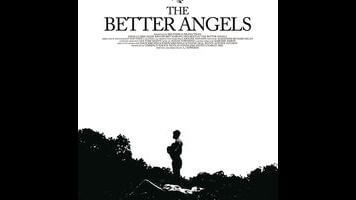Not likely. For one thing, Malick has two other films already in the can, and it’s unlikely he had time to shoot a third. More than that, though, The Better Angels lacks the ecstatic feeling conveyed by even a lesser Malick film like To The Wonder. It comes across as an apprentice work, not unlike the second-rate versions of paintings created by students who would work at the side of Renaissance masters. They have some value for what they reveal about the true artist’s working methods, but nobody with any knowledge mistakes them for the real thing.
Now for the weird part: This is a movie about Abraham Lincoln. Specifically, it’s an impressionistic portrait of Lincoln’s boyhood, exclusively covering his pre-adolescent years, around the ages of nine and 10. Newcomer Braydon Denney plays the future president, who loses his beloved mother, Nancy (Brit Marling) to “milk sickness”—a poison caught from cows that have ingested white snakeroot. Abe’s father (Jason Clarke) wastes no time in remarrying, and Sarah Lincoln (Diane Kruger) loves the boy and his sister (McKenzie Blankenship) as if they were her own. Meanwhile, Abe, despite having little education, becomes powerfully interested in reading, and a teacher (Wes Bentley) who recognizes his potential volunteers to serve as his tutor, for free. Dad is reluctant, though. Abe’s needed on the family farm.
That smidgen of conflict is all The Better Angels offers in terms of a story. To its credit, the film doesn’t play even remotely like a biopic—without the narration, provided by a cousin who grew up with Abe, there’d be little clue regarding its protagonist’s historical significance. (It’s as if The Tree Of Life had featured an epilogue revealing that the kid played by Hunter McCracken had grown up to actually become Sean Penn, rather than just a faceless character played by Sean Penn.) The vast majority of its running time is devoted to lyrical shots of children walking barefoot on logs, men swinging axes at trees, women smiling beatifically as the last rays of the setting sun catch their hair. The drawback to this approach, however, is that the film is nothing but its style, and in this case, that style is entirely secondhand. There’s nothing to think about except how closely Edwards is approximating Malick’s sensibility. As an impression of a Terrence Malick film, The Better Angels is technically faultless, unimprovable. All that’s missing is the soul.


 Keep scrolling for more great stories from The A.V. Club.
Keep scrolling for more great stories from The A.V. Club.